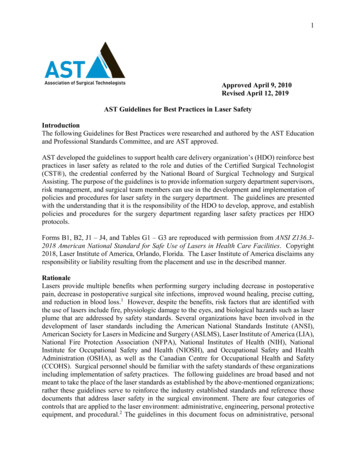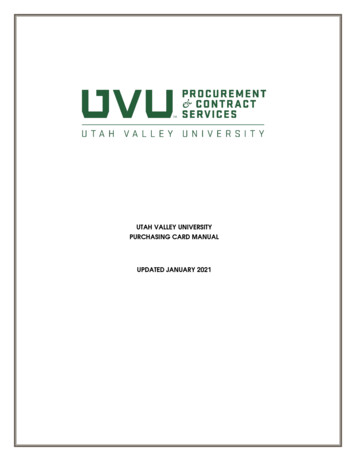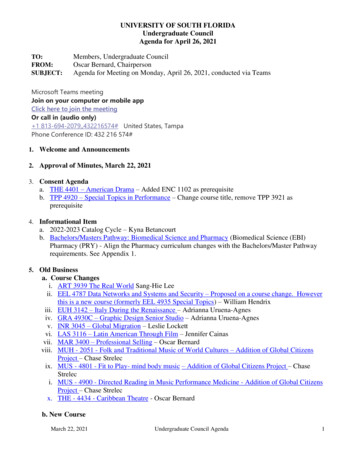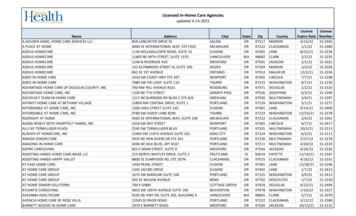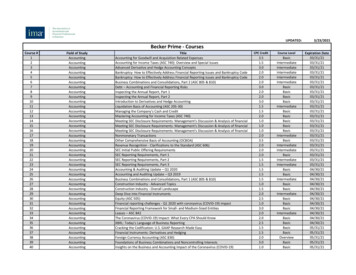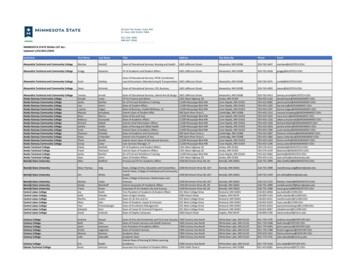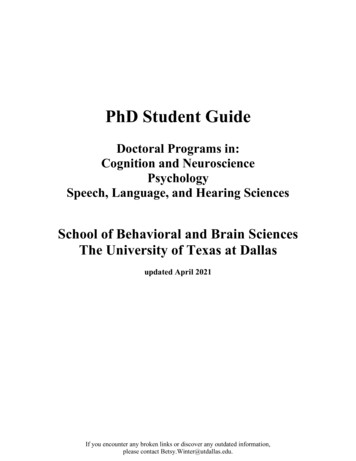
Transcription
PhD Student GuideDoctoral Programs in:Cognition and NeurosciencePsychologySpeech, Language, and Hearing SciencesSchool of Behavioral and Brain SciencesThe University of Texas at Dallasupdated April 2021If you encounter any broken links or discover any outdated information,please contact Betsy.Winter@utdallas.edu.
PhD Student Guide - BBS2TABLE OF CONTENTSINTRODUCTION . 4PhD PROGRAM ADMINISTRATION . 4Department Faculty .4Department Heads .4Associate Dean for Graduate Studies .5Dean .5Center Directors .5Academic Support Coordinators .5PhD PROGRAM FACILITIES . 5STUDENT OFFICES AND STUDY AREAS . 5ELEARNING AND COMPLIANCE TRAINING . 6PhD ADVISING. 6REGISTERING FOR COURSES . 6DEGREE PLANNING AND ANNUAL REPORTING . 7CRITERIA FOR RETENTION AND ASSISTANTSHIP FUNDING . 7LEAVE OF ABSENCE . 8SCHOLASTIC DISHONESTY . 9PhD CURRICULUM. 9Cognition and Neuroscience PhD .9Speech, Language, and Hearing Sciences PhD .10Psychology PhD .10Waiver of Coursework Requirements .11Transfer of Credit .11Master’s Degree en Route .12Clinical Certification (Speech, Language, and Hearing Sciences program).12QUALIFYING PAPERS AND PROJECTS . 12Qualifying Plan 1: Qualifying Thesis . 133Qualifying Plan 2: Research Project, plus Integrative Literature Review or Grant Application.14Evaluating Plan 2 Components: Research Projects, Integrative Literature Reviews, GrantApplications. 15Pre-Dissertation Portfolio for Psychology or Cognition and Neuroscience 17Qualifying Plan for Systems Neuroscience .29Qualifying Plan for Speech, Language, and Hearing Sciences. 21
PhD Student Guide - BBS3THE DISSERTATION . 25Dissertation Committee .25Dissertation Proposal . 255Scheduling the Dissertation Proposal Defense. 266Format of the Dissertation Proposal Defense. 266Scheduling the Final Oral Exam (Dissertation Defense) . 277Format of the Final Oral Examination (Dissertation Defense) . 277SUPPORT FOR DOCTORAL STUDY . 277Graduate Assistantships . 277Teaching Assistants . 278Research Assistants . 288TA and RA Salaries and Appointments. 288Renewal of Assistantships . 299Assistantship Responsibilities During Semester Breaks . 299Other Grants and Scholarships .29Travel Funds.30Dissertation Support .30
PhD Student Guide - BBS4INTRODUCTIONThe BBS PhD Student Guide is a working document that provides information on policies and proceduresin the PhD Programs in the School of Behavioral and Brain Sciences (BBS). It does not replace, butrather supplements, information you can find from official University sources, including the Office ofGraduate Education and the Graduate Catalog.The BBS faculty and its representatives on the Graduate Studies Committee may make changes whichcould affect students during their time at UTD. Likewise, legislative actions, financial realities, orchanges in University policy may affect academic requirements. Our curricula and requirements are undercontinuing faculty review. When changes occur, we will do our best to notify you in a timely manner, sobe sure to check your UTD e-mail regularly. If you have questions not answered in this Guide or you areunsure about policies and procedures, please contact Dr. Stillman, Associate Dean for Graduate Studies,or your Department Head (Dr. Thompson for Neuroscience, Dr. Le Prell for Speech, Language, andHearing, or Dr. Holub and Dr. Kennedy for Psychology.)Like all universities here and abroad, financial pressures resulting from declining government supportwill impact faculty and students alike. Fortunately, UT Dallas is a healthy and growing institution andhas not experienced the severe cutbacks other universities have faced. Nonetheless, we will be expected tomake our programs more efficient and effective. Time to degree is an important measure of programefficiency and there will be pressure on students and their mentors to decrease the time between programmilestones. There will also be regular and rigorous evaluation of student performance. We must becertain that the students in whom we invest our time and financial resources are the ones having thegreatest likelihood of success in the program and their careers.PhD PROGRAM ADMINISTRATIONDepartment Faculty: Each PhD program is located in one of the 3 BBS Departments. The 2 tracks of theCognition and Neuroscience PhD are each located in a different Department. The Departmental faculty inNeuroscience, Psychology, and Speech, Language, and Hearing are responsible for the PhD programs intheir Departments. They develop the PhD program’s curriculum and requirements, advising andmentoring, and evaluation of student performance and progress.Your research advisor is the primary faculty member with whom you will work; he or she will provideresearch mentoring, help you select courses, and carry out other responsibilities described in the“Advising” section.Department Heads: Dr. Kennedy for the Cognitive Neuroscience track of the Cognition andNeuroscience program, Dr. Thompson for the Neuroscience track of the Cognition and Neuroscienceprogram, Dr. Le Prell for Speech, Language, and Hearing Sciences, and Dr. Holub for Psychology.Consult your Department Head on any issue relating to doctoral study, including information on programrequirements, procedures and opportunities, assistantship assignments, and other student academic issues.
PhD Student Guide - BBS5Associate Dean for Graduate Studies: The Associate Dean for Graduate Studies (Dr. Stillman)coordinates all BBS graduate programs. The Associate Dean also serves on the UTD Graduate Counciland is the School’s liaison with the UTD Dean of Graduate Education (Dr. González).Dean: The Dean (Dr. Small) oversees all of the School’s academic and research activities.Center Directors: Each of the School’s six Centers has a director who oversees PhD student participationin its research and other activities. They are: Dr. Shoup at the Callier Center for CommunicationDisorders; Dr. Chapman at the Center for BrainHealth; Dr. Rugg at the Center for Vital Longevity; Dr.Owen at the Center for Children and Families; Dr. Price at the Center for Advanced Pain Studies; and Dr.Kilgard at the Texas Biomedical Device Center.Academic Support Coordinators: Each PhD program has an academic support coordinator (ASC) whoassists PhD students with course registration, completing administrative forms, and other needs asdescribed in this Guide. For Cognition and Neuroscience, the ASC is Cymone Samuels. For Psychology,the ASC is Betsy Winter. For Speech, Language, and Hearing Sciences, the ASC is Ciara Owens.PhD PROGRAM FACILITIESSome offices, classrooms and research facilities of the School of Behavioral and Brain Sciences arelocated on the Richardson campus; others are located in the School’s six centers. The Callier Center forCommunication Disorders-Dallas, the Center for BrainHealth, and the Center for Vital Longevity arelocated near the campus of the UT Southwestern Medical Center at Dallas. The Center for Children andFamilies, the Center for Advanced Pain Studies, and the Texas Biomedical Device Center are located onthe main campus. The Callier Center has a primary focus on speech, language, and hearing and includesresearch laboratories, clinical services, and educational programs for children and adults with a widevariety of communication needs. The Center for Children and Families offers clinical and communityoutreach activities organized around three initiatives: parenting healthy families, strengtheninginterpersonal relationships, and enhancing thinking and learning. The Center for BrainHealth emphasizesresearch activities in the areas of developmental disorders, clinical neuroscience, and aging. Research atthe Center for Vital Longevity focuses on cognitive aging, age-related diseases affecting cognition, andfactors which support successful aging. The Center for Advanced Pain Studies is pursuing lines ofresearch aimed at alleviating suffering from pain and improving the lives of people with chronic painand/or migraine. The Texas Biomedical Device Center aims to develop technologies to prevent injuries,detect impairments, and restore quality of life lost due to neurological injuries and disease. The Centers’collaborative arrangements with the UT Southwestern Medical School expand PhD student researchopportunities including access to clinical populations and brain imaging and other research facilities.STUDENT OFFICES AND STUDY AREASFull-time doctoral students are eligible for shared office space or a carrel in a study area; space isavailable in several locations on the Richardson campus and the off-campus Centers. Students whoseprimary location is in an off-campus Center should contact their Department Head or appropriate Centeradministrator to request an office/carrel assignment. Because of the shortage of space, we cannot assurethat all students will have office space. Students who do not need or use the space will be asked torelinquish it. Students whose office is located in one of the Centers, but who have TA responsibilities onthe Richardson campus, may sign up for shared space when holding office hours. One of the AcademicSupport Coordinators will send out an email before each semester to allow students to sign up for TAtimes in the shared office. There are currently 2 shared offices available in CRA for TA’s to use whenmeeting with students. The School does not provide computers or other equipment for the student officesand shared spaces.
PhD Student Guide - BBS6ELEARNINGTo access eLearning, students use their Ne
Fortunately, UT Dallas is a healthy and growing institution and has not experienced the severe cutbacks other universities have faced. Nonetheless, we will be expected to make our programs more efficient and effective. Time to degree is an important measure of program efficiency and there will be pressure on students and their mentors to decrease the time between program milestones. There wi .



